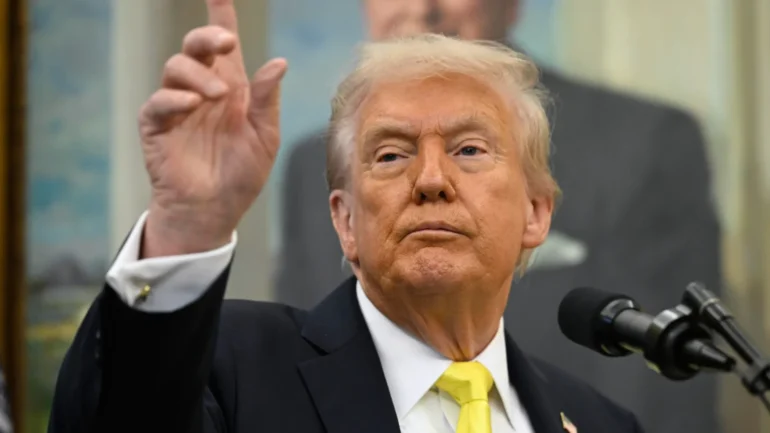On October 15, 2025, President Donald Trump announced that he had authorized the Central Intelligence Agency (CIA) to conduct covert operations in Venezuela, intensifying the United States’ pressure campaign against Venezuelan President Nicolás Maduro’s government. This move marks a significant escalation in U.S. actions, which have already included lethal strikes on boats in the Caribbean, condemned by Democrats and United Nations experts as unlawful. Trump also hinted at the possibility of military strikes on Venezuelan land, raising concerns about a potential broader conflict.
Covert Operations and Regional Tensions
Trump’s announcement confirmed a New York Times report about a classified directive, or “finding,” that allows the CIA to conduct covert activities in Venezuela. These operations could range from intelligence gathering to training opposition forces or even executing lethal strikes. While Trump did not clarify whether the CIA’s goal is to overthrow Maduro, he suggested that Venezuela is “feeling the heat” from U.S. actions. The administration has also deployed warships, a nuclear-powered submarine, and fighter jets to the Caribbean, framing these moves as part of an anti-drug trafficking effort.
Maduro, whose legitimacy as president has been questioned internationally after a disputed election in 2024, strongly condemned the U.S. actions. In a televised address, he called them “CIA-orchestrated coups d’état” and urged for peace, stating, “No to war in the Caribbean … No to regime change.” Maduro ordered military exercises in Venezuela’s largest shantytowns and mobilized the military, police, and civilian militia to defend the country’s key infrastructure, including its oil reserves.
Trump’s Justifications and Controversial Claims
Trump justified the CIA’s involvement by claiming that Venezuela has been releasing prisoners, including individuals from mental health facilities, into the United States. He also accused Venezuela of being a major source of drugs entering the U.S. via the Caribbean. However, experts have repeatedly questioned the validity of these claims. Venezuela is not considered a primary source of drugs like fentanyl, which is more commonly linked to other regions. Additionally, Trump’s assertions about Venezuelan prisoners lack substantiated evidence, echoing unproven claims from his 2024 campaign.
The Trump administration has labeled Maduro as the head of the “Cartel of the Suns,” a supposed drug trafficking organization involving Venezuelan officials. The U.S. has placed a $50 million bounty on Maduro’s capture, doubling the previous amount in August 2025. Trump has also designated eight drug cartels, including the Cartel of the Suns, as foreign terrorist organizations, escalating the legal framework for U.S. actions against them.
Lethal Strikes and International Criticism
The U.S. has conducted at least five strikes on suspected drug trafficking boats in the Caribbean, killing at least 27 people. These attacks, carried out by Special Operations units under the Department of Defense, have drawn significant criticism. UN human rights experts labeled the strikes “extrajudicial executions” that violate international law, and a Democratic congressman called them “illegal killings” unlikely to hold up in court. In Congress, both Democrats and Republicans have expressed concern over the lack of transparency and congressional oversight in these operations. Senator Jeanne Shaheen, a ranking member of the Senate Foreign Relations Committee, warned that the U.S. is sliding “closer to outright conflict with no transparency, oversight, or apparent guardrails.”
Broader Implications and Congressional Concerns
The Trump administration’s actions have raised fears of a potential regime-change operation in Venezuela. While Trump has publicly denied that regime change is the goal, his national security team, including Secretary of State Marco Rubio and CIA Director John Ratcliffe, reportedly favors stronger measures against Maduro. The CIA has increased its presence in the Caribbean and Central America, focusing on intelligence collection rather than direct armed operations. However, the agency’s new Americas and Counternarcotics Mission Center is reportedly well-funded and empowered to take aggressive action.
Critics worry that unilateral U.S. actions could damage relationships with allied countries in the region, such as Mexico and Colombia, which have historically cooperated on counternarcotics efforts. Congressional leaders have called for clearer military objectives and an explanation of how these operations might conclude. Some speculate that the CIA’s actions could be a psychological operation to create fear and instability in Venezuela, rather than an immediate push for military conflict.
Maduro’s Response and Venezuela’s Defiance
In response to the U.S. strikes and covert operations, Maduro has mobilized Venezuela’s military and civilian forces, emphasizing national defense. He has also continued to accept U.S. deportation flights of Venezuelan citizens, which occur twice weekly. Venezuela’s Foreign Minister Yván Gil rejected Trump’s “warmongering” statements, describing the U.S. military presence as a policy of “aggression, threat, and harassment.” Maduro has framed his resistance as a stand against U.S. imperialism, drawing parallels to past interventions in Afghanistan, Iraq, and Libya.
A Precarious Path Forward
Trump’s authorization of CIA operations in Venezuela, combined with ongoing military actions in the Caribbean, has heightened tensions in the region. The lack of clear objectives and oversight has alarmed lawmakers and international observers, who fear the U.S. may be on the brink of another prolonged conflict. As Maduro strengthens Venezuela’s defenses and the U.S. escalates its pressure, the situation remains volatile, with significant implications for both nations and the broader Western Hemisphere.
